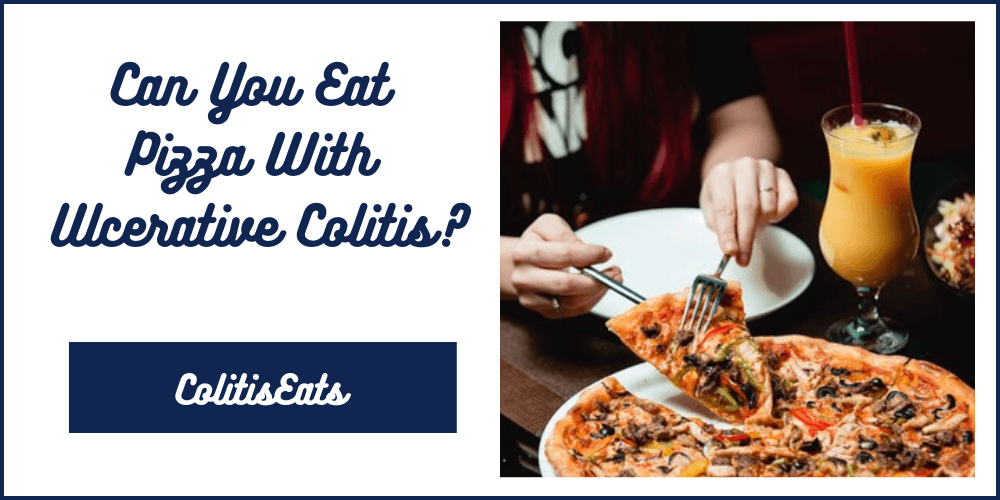
Pizza, with its irresistible combination of a crispy crust, tangy tomato sauce, and melty cheese, is a beloved treat enjoyed by people around the world. However, for those dealing with ulcerative colitis, a chronic inflammatory bowel disease, “Can You Eat Pizza With Ulcerative Colitis?” indulging in this classic comfort food can be a matter of concern. The deliciousness of pizza often clashes with the dietary restrictions necessitated by ulcerative colitis.
In this article, we’ll explore the relationship between pizza and ulcerative colitis, deciphering whether you can enjoy a slice or two without triggering a flare-up. We’ll provide insights, tips, and alternatives for those grappling with this pressing question, aiming to help individuals with ulcerative colitis savor the joy of pizza while managing their condition.
Can You Eat Pizza With Ulcerative Colitis?
Ulcerative colitis is a chronic inflammatory bowel disease primarily affecting the colon and rectum. When managing ulcerative colitis, paying close attention to your diet is crucial, as certain foods can exacerbate symptoms. Pizza is a popular but complex food choice for individuals with this condition. Whether you can eat pizza with ulcerative colitis depends on various factors.
The crust of pizza is typically made from wheat flour, which contains gluten. Gluten can be problematic for some people with ulcerative colitis, as it may worsen inflammation and digestive discomfort. If you are sensitive to gluten, opting for a gluten-free pizza crust or exploring other dietary alternatives might be beneficial.
The sauce on pizza can also pose a challenge. Many commercial pizza sauces contain high levels of acidity and spices, which can irritate the already inflamed gastrointestinal tract of individuals with ulcerative colitis. To mitigate this, you can consider making your own pizza with a mild tomato sauce or trying alternative toppings like pesto or olive oil.
The toppings on pizza can make a significant difference. Fatty and processed toppings like pepperoni and sausage may trigger symptoms, as they are high in saturated fats and preservatives. Opt for lean protein sources such as grilled chicken or turkey and load up on vegetables like bell peppers, mushrooms, and spinach, which can be easier on your digestive system.
Cheese is another consideration. Some individuals with ulcerative colitis may have trouble digesting dairy products due to lactose intolerance or a general sensitivity to dairy. If this is the case for you, there are dairy-free cheese alternatives available to enjoy your pizza without the discomfort.
Portion size matters as well. Eating smaller portions can help minimize the risk of overloading your digestive system. Additionally, it’s essential to monitor your body’s response to pizza and other trigger foods, as individual tolerances vary.
In summary, while enjoying pizza with ulcerative colitis may require some modifications, it’s not entirely off the menu. Making thoughtful choices such as a gluten-free crust, mild sauces, appropriate toppings, and monitoring portion sizes can make it a more digestive-friendly option. However, it’s essential to consult with a healthcare professional or a registered dietitian to create a personalized diet plan that takes into account your specific needs and triggers, as managing ulcerative colitis involves a tailored approach to dietary choices.
Can I eat tomato sauce with ulcerative colitis?
If you have ulcerative colitis, it’s important to be mindful of your diet to manage your symptoms effectively. Tomato sauce can be problematic for some individuals with ulcerative colitis due to its acidity and potential to trigger digestive discomfort. The high acidity of tomato sauce can irritate the lining of the colon and exacerbate symptoms like abdominal pain and diarrhea.
However, the tolerance for tomato sauce varies from person to person. Some individuals with ulcerative colitis may be able to consume it in moderation without issues, while others may find it triggers symptoms. It’s advisable to experiment with small amounts and observe how your body reacts. If you experience discomfort, it’s best to avoid or limit your intake of tomato sauce. Opt for low-acid alternatives or cook tomatoes thoroughly to reduce their acidity.
Always consult with a healthcare professional or registered dietitian who can provide personalized dietary recommendations based on your specific condition and needs.
Does cheese aggravate ulcerative colitis?
Cheese and other dairy products can potentially aggravate ulcerative colitis (UC) symptoms for some individuals, but the impact varies from person to person. UC is an inflammatory bowel disease characterized by inflammation of the colon and rectum. Dairy products, including cheese, are known to be high in lactose, which can be difficult to digest for people with lactose intolerance, a common issue among those with UC.
Lactose intolerance can lead to gastrointestinal symptoms such as bloating, diarrhea, and abdominal pain, which may worsen UC symptoms or trigger flare-ups. Additionally, some individuals with UC may be sensitive to certain components in dairy, like casein or whey proteins, which could exacerbate inflammation and discomfort.
However, not everyone with UC experiences these issues with cheese, and some may tolerate dairy products without problems. It’s important for individuals with UC to monitor their diet and identify specific triggers through trial and error, and consulting with a healthcare professional or a registered dietitian can help develop a personalized diet plan to manage UC symptoms effectively.
What kind of pizza can I eat with colitis?
If you have colitis, it’s essential to choose pizza toppings and crust options carefully to minimize irritation and discomfort. Opt for a thin, whole-grain crust as it’s generally easier to digest than thicker, doughier alternatives.
Selecting a tomato-based sauce rather than creamy or spicy options can also be gentler on your digestive system. When it comes to toppings, lean towards well-cooked, easily digestible ingredients such as grilled chicken, turkey, or well-cooked vegetables like spinach, bell peppers, and zucchini.
Avoid high-fat toppings like pepperoni and sausage, as these can be harder to digest and may exacerbate symptoms. Additionally, consider using lactose-free or dairy alternatives for cheese, or skip it altogether if dairy triggers your symptoms. Ultimately, everyone with colitis may have different trigger foods, so it’s essential to pay attention to your body’s response and consult with a healthcare professional or a registered dietitian for personalized dietary guidance.
Final Thoughts
At the end, addressing the question, “Can You Eat Pizza With Ulcerative Colitis?” requires some thoughtful modifications and a keen understanding of your body’s unique sensitivities. Common pizza ingredients like tomatoes and cheese may need to be adjusted or substituted.
Ultimately, it’s crucial to consult with a healthcare professional or a dietitian to create a personalized diet plan that accommodates your specific needs. With the right choices, you can still relish a slice of pizza without triggering discomfort.
Sources:
- By Jay Pardesi, What are the best foods to ease my Chronic ulcerative colitis? uploaded 7 years ago.
Related posts:


